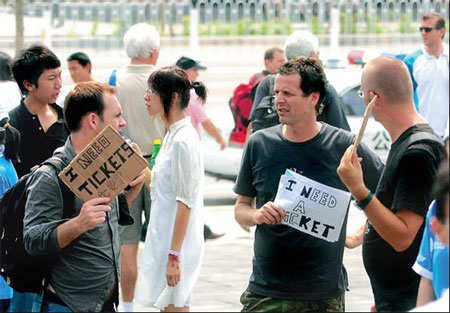|

|
|
Foreigners outside Beitucheng subway station on Wednesday hold up signs advertising they are in the market for Olympic tickets. Yuan Zhou |
While the action was fast and furious at the Water Cube yesterday, just a mile away at the Olympic Green, the competition was equally hot, as ticket scalpers from home and abroad touted for business.
With a sign around his neck saying "Want Olympic tickets for any game" (written in both English and Chinese), a 20-something man, who said he was a university student from the United States, patrolled the area outside Beitucheng subway station, the transfer point for spectators en route to the Green.
"What do you have?" he asked a Chinese man who approached him.
"How much?" he asked.
"I'll take them."
The "student", who refused to give his name, was clearly happy with the deal; no doubt confident he could sell on his latest acquisitions to an unwary or simply desperate buyer sometime later that day.
China Daily discovered he had earlier bought two tickets for the shooting competition from a Chinese scalper for 500 yuan ($73) apiece. He sold the pair to two Danish tourists for 1,600 yuan.
Over the next hour, he sealed at least five more deals. In most he acted purely as a middleman between Chinese scalpers and Western buyers.
But he was by no means alone. The scalpers were easy to spot as they lurked, waiting for business.
Occasionally they would congregate to discuss favorite hunting grounds or to share information about potential buyers.
They spoke mostly in English - with various accents - and sometimes in broken Mandarin.
The Chinese scalping fraternity was of a similar size to the international group and had an equally diverse membership, with accents from across China clearly heard.
The difference between the two, it seemed, was that the foreigners had access to the really big spenders.
"We can't beat them because we can't speak a foreign language," a scalper with the surname Liu from Xi'an, Shaanxi province, said.
"But we just don't know how they manage to get so many tickets."
Ticket scalping is illegal in China, and BOCOG, the Games organizers, has introduced a number of measures to try and stop the traders.
Recently, police arrested a group of Chinese scalpers right in front of their foreign counterparts, Liu said.
"The police don't care about the foreigners, but they keep a close eye on us," he said.
A police officer on patrol near Beitucheng, who refused to give his name, said most of the people in the area were just "swapping tickets or selling them at a reasonable price".
Shortly after, a China Daily reporter was approached by a Chinese couple touting a pair of tickets for a finals day at the Bird's Nest for the very unreasonable price of 5,000 yuan.
Despite that, local media reported recently that Beijing police authorities are screening all information posted on the websites 263.com and 58.com, whose forums are frequented by local scalpers.
Whatever is or is not being done to combat the scalpers, the ultimate victims are people like German tourist Eveline Schuster-Stahl.
She told China Daily that she and her husband had gone to Beitucheng to look for tickets to "anything over the next few days" but that the prices they had been quoted were far above what they could afford.
"We went to Athens and Barcelona, and the tickets there were more expensive, but they were much easier to get," Schuster-Stahl said.
"I just can't understand how come there are so many people hawking tickets, while there are empty seats in the stadiums and BOCOG is saying they are all sold out."
A BOCOG spokesman said recently that most of the empty seats were ones reserved for Olympic Families, who had failed to turn up.
(China Daily August 15, 2008)